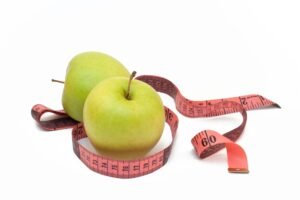Losing weight can be a significant challenge that many people face in their lives. With so much information available, it can be hard to know where to start, what to do, or even how to begin losing weight. But it doesn’t have to be complicated. In fact, losing weight can be made simple with just a few small changes to your daily routine. In this blog post, we will share with you ten tips that can help you achieve a healthier lifestyle and lose weight naturally. From making healthier food choices to adding more physical activity to your day, these tips are simple yet effective ways to improve your overall health and well-being. So, get ready to take control of your health and start your journey to a healthier, happier you!
1. Set realistic weight loss goals

Image: unsplash
Setting realistic weight loss goals is crucial for success. Losing weight is a journey and it takes time to achieve your desired results. It’s important to set realistic expectations for yourself to avoid disappointment and frustration.
Start by setting a goal that is achievable and measurable. It’s important to consider your starting point, lifestyle, and schedule when setting your goals. If you have a busy schedule, it may be difficult to commit to an intense exercise routine every day, but you can commit to small changes like walking for 30 minutes a day, taking the stairs instead of the elevator or switching to healthier food options.
It’s also important to be patient and understand that weight loss is not a linear process. There will be ups and downs along the way, and that’s okay. Celebrate small victories, like losing a pound or fitting into a smaller size clothing.
Remember, the goal is to achieve a healthy lifestyle, not just a number on the scale. Be kind to yourself and enjoy the journey towards reaching your weight loss goals.
2. Keep a food diary
Keeping a food diary is a simple yet highly effective way to track what you’re eating and manage your weight loss goals. Writing down what you eat and drink throughout the day can help you identify patterns and areas where you can make healthier choices.
Not only will a food diary help you keep track of your calorie intake, but it can also help you identify any emotional triggers that may be causing you to overeat. For example, you may notice that you tend to snack more when you’re feeling stressed or anxious. By recognizing these triggers, you can find healthier ways to cope with your emotions instead of turning to food.
There are many ways to keep a food diary. Some people prefer to use a notebook or journal, while others use apps or online tools to track their meals. The key is to find a method that works best for you and stick with it.
Remember, the more detailed your food diary is, the more helpful it will be. Be sure to include the time of day, the type of food and drink, the portion size, and any other relevant details such as where you were and who you were with. Over time, you may start to see patterns emerge that can help you make healthier choices and meet your weight loss goals.
3. Drink water before meals
Drinking water before meals is a simple yet effective way to aid weight loss. In fact, studies have shown that drinking water before meals can help you eat less and ultimately lose weight.
When you drink water before a meal, it fills up your stomach and creates a feeling of fullness. This can help you eat less during the meal because you don’t feel as hungry. Additionally, drinking water can help boost your metabolism, which is essential for weight loss.
One study found that participants who drank water before meals lost 44% more weight over a 12-week period than those who did not. Another study found that drinking water before breakfast resulted in a 13% reduction in calorie intake during the meal.
But how much water should you drink before a meal? Experts recommend drinking 16 ounces (about two glasses) of water half an hour before meals to reap the benefits. This amount of water can help curb your appetite and prevent overeating.
Drinking water before meals is a simple yet effective habit that can help you lose weight and improve your overall health. So next time you’re sitting down to eat, make sure to grab a glass of water first.
4. Eat more lean protein
If you are trying to lose weight, eating more lean protein can be an effective way to help you achieve your goal. Protein is a crucial macronutrient that plays a vital role in building and repairing tissues, producing enzymes and hormones, and maintaining healthy bones and muscles.
Eating protein can also help you feel full for longer periods, reducing your overall calorie intake and helping you avoid snacking on unhealthy foods. Lean protein sources include chicken, turkey, fish, beans, lentils, tofu, and low-fat dairy products.
To incorporate more lean protein into your diet, you can start by swapping out high-calorie meat dishes with lean protein alternatives. For example, you can replace a beef burger with a turkey burger, or have grilled fish instead of a steak.
Another way to increase your protein intake is to add it to your meals as a side dish or snack. For instance, you can have a hard-boiled egg as a mid-morning snack or add a scoop of protein powder to your smoothie.
Remember to balance your lean protein intake with other important nutrients, such as fruits, vegetables, whole grains, and healthy fats, to ensure you are getting a well-rounded and nutritious diet. With these simple tips, you can easily incorporate more lean protein into your meals, boost your metabolism, and achieve your weight loss goals.
5. Cut back on sugar and processed foods

Image: unsplash
Cutting back on sugar and processed foods is an essential step in losing weight and becoming healthier. Sugar and processed foods are often high in calories, low in nutrients, and can lead to weight gain and other health problems.
One of the easiest ways to cut back on sugar is to avoid sugary drinks like soda, energy drinks, and fruit juices. These drinks are often loaded with added sugars and can add hundreds of calories to your daily intake without providing any nutritional benefits. Instead, switch to water, herbal tea, or low-calorie drinks like sparkling water.
Processed foods, on the other hand, are often high in sodium, unhealthy fats, and preservatives. These foods can be convenient and tasty but are generally lacking in the nutritional value that your body needs. Try to replace processed foods with whole foods like fruits, vegetables, whole grains, lean proteins, and healthy fats.
If you’re not used to eating whole foods, start by making small changes to your diet. For example, try swapping a processed snack for a piece of fruit or a handful of nuts. Gradually make more changes until your diet is mostly made up of whole, nutrient-dense foods.
Making these changes to your diet can be challenging at first, but the benefits of cutting back on sugar and processed foods are well worth it. You’ll likely notice an increase in energy, a reduction in cravings, and an overall improvement in your health and wellbeing.
6. Find an exercise routine that works for you
Finding an exercise routine that works for you can be a game-changer when it comes to losing weight and becoming healthier. It’s important to find an exercise routine that you enjoy and that suits your lifestyle. This way, you’re more likely to stick with it in the long run.
If you’re someone who enjoys the great outdoors, why not try hiking or cycling? If you prefer being in a group setting, you could join a fitness class or a sports team. Alternatively, if you prefer working out at home, there are plenty of online workout videos and apps that you can try.
It’s also important to mix up your exercise routine to prevent boredom and plateauing. Try incorporating different types of exercises, such as cardio, strength training, and flexibility training, into your routine.
Remember, exercise doesn’t have to be a chore. It can be something that you look forward to and enjoy. By finding an exercise routine that works for you, you’ll not only be on your way to reaching your weight loss goals, but you’ll also be improving your overall health and wellbeing.
7. Don’t skip meals
Skipping meals may seem like a good way to reduce your calorie intake, but it can actually have the opposite effect. When you skip meals, you are more likely to feel hungrier later on, leading you to overeat or make poor food choices. Additionally, your body may go into starvation mode, slowing down your metabolism and making it harder to lose weight.
Instead of skipping meals, focus on making healthy choices and eating smaller, more frequent meals throughout the day. This will help keep your metabolism revved up and prevent you from getting overly hungry. Eating every few hours also helps keep your blood sugar levels stable, reducing the likelihood of crashes and cravings for unhealthy snacks.
Try to plan out your meals and snacks in advance, so you always have healthy options on hand. This will also help you avoid the temptation to grab fast food or other unhealthy options when you’re on the go. Remember, consistency is key when it comes to healthy eating habits, so aim to make small, sustainable changes to your diet over time.
8. Use smaller plates and portion control
If you’re trying to lose weight or maintain a healthier lifestyle, using smaller plates and portion control can be a game-changer. It’s easy to overeat when your plate is overflowing with food, but by using a smaller plate, you can trick your brain into thinking you’re eating more than you actually are. This can help you feel satisfied with less food, resulting in fewer calories consumed overall.
Portion control is also key. Often, we eat more than we actually need simply because it’s in front of us. Try using measuring cups or a food scale to accurately portion out your food. This can be especially helpful when it comes to calorie-dense foods like pasta, rice, and nuts. By controlling your portions, you can still enjoy your favorite foods without overdoing it.
Another tip is to pay attention to your hunger and fullness cues. Don’t eat until you’re stuffed; instead, stop eating when you feel satisfied but not overly full. It takes time for our brains to register that we’re full, so eat slowly and savor each bite. And remember, it’s okay to leave food on your plate if you feel full.
Incorporating smaller plates and portion control into your daily routine can be a simple yet effective way to achieve your weight loss goals and maintain a healthier lifestyle long-term.
9. Get enough sleep

Image: pexels
Many people do not realize the importance of a good night’s sleep, especially when it comes to losing weight. Sleep is essential for our body to function properly, and it plays a crucial role in maintaining a healthy weight.
When we don’t get enough sleep, our body produces more of the hormone ghrelin, which stimulates our appetite, and less of the hormone leptin, which suppresses our appetite. As a result, we tend to feel hungrier and crave unhealthy foods, leading to overeating and weight gain.
Lack of sleep can also affect our metabolism, making it harder for our body to burn calories efficiently. Additionally, when we are tired, we tend to be less active, which can further contribute to weight gain.
To ensure that we get enough sleep, it’s important to establish a consistent sleep routine and aim for 7-8 hours of sleep each night. Avoiding caffeine and alcohol before bedtime, creating a relaxing sleep environment, and avoiding screen time before sleeping are also helpful in maintaining a healthy sleep routine.
Getting enough sleep is not only crucial for our physical health but also our mental and emotional well-being. By prioritizing sleep, we can improve our overall health and achieve our weight loss goals.
10. Stay motivated and accountable
One of the biggest challenges when it comes to losing weight is staying motivated and accountable. It’s easy to start off strong and stay on track for the first few weeks, but then life gets in the way and it becomes harder to stick with it. However, staying motivated and accountable is crucial for achieving your weight loss goals. Here are a few tips to help you stay on track:
1. Set realistic goals: Make sure your goals are achievable and realistic. Setting goals that are too big or unrealistic can be discouraging and may cause you to give up.
2. Find a workout buddy: Having someone to exercise with can help keep you motivated and accountable. Find a friend or family member who shares your fitness goals and work out together.
3. Use a fitness tracker: Fitness trackers can help you keep track of your progress and motivate you to keep going. Set daily step goals and challenge yourself to beat them each day.
4. Reward yourself: Treat yourself to something special when you reach a milestone. This will give you something to look forward to and help keep you motivated.
5. Keep a journal: Write down your progress and how you feel each day. This will help you stay accountable and motivated.
6. Join a weight loss support group: Joining a support group can provide you with encouragement, accountability, and motivation.
7. Follow fitness influencers on social media: Social media can be a great source of motivation. Follow fitness influencers who post motivational quotes, workout routines, and healthy meal ideas.
8. Hire a personal trainer: A personal trainer can provide you with individualized attention and help you stay accountable.
9. Track your meals: Keeping track of what you eat can help you stay accountable and aware of how much you’re eating.
10. Visualize your success: Imagine how you will look and feel when you reach your weight loss goals. Visualizing success can help keep you motivated and on track.







Leave a Reply